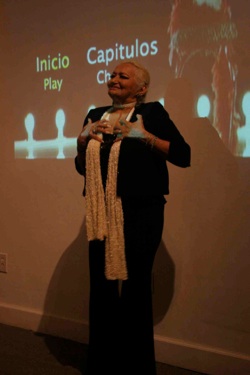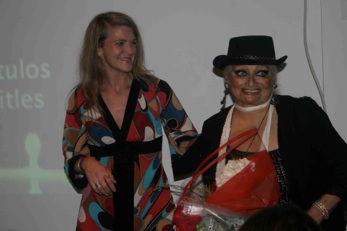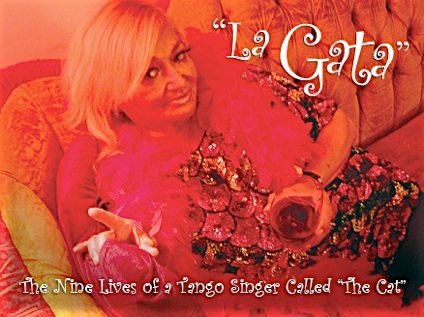In 2004, in an effort to make a segue from print to audio-visual journalism, Gage organized a professional film crew and began following La Gata, a 79-year-old tango singer from Argentina who continues to perform in Miami for a younger generation of Latin American immigrants. The project was supposed to be a practice news reel, but Gage quickly realized Gata’s story merited a feature-length documentary film. The film won Best USA Documentary Feature at the 2008 Women’s International Film Festival in Miami.


“LA GATA: The Nine Lives of a Tango Singer Called the ‘The Cat’ premiered December 15th at the Miami Beach Cinematheque.
DOCUMENTARY PRESS REVIEWS:
THE MIAMI SUN POST
December 15, 2006
The Tango Blues
A Living Legend Refuses to Quit
“Her diva-esque appearance, comical tango interpretations and endearing but sometimes cantankerous personality had ‘documentary’ written all over it.”
By Rayme Samuels
Julienne Gage’s debut documentary, La Gata: The Nine Lives of a Tango Singer Called the Cat, chronicles the life of a 79-year-old Argentine, tango-singing, world-traveling, buxom blonde who has experienced a lifetime of adventure. “My life is like a tango — sometimes funny, sometimes tragic, but always passionate,” La Gata explains.
By night the diva can be found on a stage, always with a glass of red wine in hand, belting out poignant songs from her homeland. By day she cleans offices with a resilient dignity to make a decent living.
This movie is a testament to the drive of an artist who has survived alone in the world. An orphan in a 1920s Buenos Aires convent, La Gata grew up and took South America by storm with only a third-grade education, good looks and an irresistible charm. After traveling solo throughout the continent, she found her way to Europe, and finally Miami.
Referring to her feline moniker, La Gata has already enjoyed seven out of her nine lives. But with each day, she identifies more with her inner youthfulness. La Gata refuses to hang out with people her age because she finds the lifestyle of most elderly people too comfortable. Instead, she prefers to party until 5 a.m. with 20- and 30-somethings who are often ready to go home hours before the movie’s protagonist. Enjoyable and informative sound bites are taken from La Gata’s youthful Argentine fan base in Miami.
“I was completely taken aback by her character because here was this glamorous elderly woman hanging out with a bunch of young rockers and bohemian artists,” said Gage, 33, a Miami Beach-based journalist and the director and producer of this captivating documentary.
“Everything about her was perfect for an audio-visual project. Her diva-esque appearance, her comical tango interpretations, and her endearing but sometimes cantankerous personality had ‘documentary’ written all over it,” Gage continued. “As soon as I started talking with other journalists about Gata, I had cameramen and editors volunteering to donate their time to turn the project into a film.” The Miami-Dade County Department of Cultural Affairs also supported Gage’s project with a grant. “The theoretical cost of making this documentary was close to $100,000; I probably spent $9,000,” Gage explained.
The movie takes a somber turn as La Gata describes the hardships of her daily life as an undocumented immigrant in Miami. She wants viewers to know that her tears are not a sign of dramatics, but rather the intensity of the bitterness she feels about her current situation. The scene dramatically shifts from an image of La Gata washing windows, to that of a proud woman decked in jewels and throwing her head back while wailing a beautiful tango song.
It serves as a tribute to South Florida’s 200,000-strong Argentine community, whose immigration was largely a result of the economic crisis that exploded in the South American nation in 2001. Gage postulates, “The lyrics of the tango offer incredible insight into the lives of immigrants and the downtrodden because tango was created by immigrants in Argentina. The sung tango is melancholy, tragic, ironic and yet celebratory— just like Gata.”
La Gata: The Nine Lives of a Tango Singer Called the Cat unspools at 8 p.m. Friday at the Miami Beach Cinematheque, 512 Española Way, Miami Beach. Gata is scheduled to attend the premiere, where, says Gage, Gata will have a chance to see her movie, almost three years in the making, for the first time.
THE MIAMI NEW TIMES
Dec 14, 2006
The Cat Purrs
A new documentary tells the tale of a tango queen
By Frank Houston
Near the end of La Gata, a documentary about Argentine tango goddess María Angelica Milán, director Julienne Gage and her cameraman, Gustavo Acosta, almost off-handedly capture the perfect image of their subject. Milán, who is 79 years old, is seated next to another woman maybe five or ten years her senior. While the elder woman clutches a Styrofoam cup and gazes around benevolently, Milán is busy peering into a compact and applying lipstick.
She hardly needs it. The ageless Milán's long blond hair cascades over her shoulders, and her makeup and false eyelashes are meticulously applied. But what really makes the octogenarian singer so damn sexy is her attitude, her poise, her perspective — her soul.
As the hour-long Spanish-language doc's subtitle (The Nine Lives of a Singer Called "The Cat") somewhat laboriously puts it, Miami resident Milán, The Cat, really has had multiple lives. (Not nine, but seven by her count.) At age 22, she was kicked out of the Buenos Aires convent where she'd been raised. Armed with little more than her charm, looks, and a third-grade education, she went on to sing professionally in Chile, Spain, Paris (to a rarefied audience that included Brigitte Bardot), Mexico, New Orleans, and New York before coming to Miami in 1987.
Here, in the Magic City, La Gata's life turned less than magical. Enticed by a gig at a club that never opened, Milán ended up cleaning homes for seventeen years. In 2004 she was offered a regular slot at Café One Ninety, but the place closed a year later. "My life is like a tango," Milán says in the film. "Sometimes tragic, always passionate."
Gage's primary strength as a filmmaker seems to be her interviewing skills — she is a journalist and occasional New Times contributor making her first foray into film. She unobtrusively (only one or two of her questions are heard in La Gata) has teased out enough of Milán's life story that much of the documentary is narrated by its subject.
Of the many commentators on the life of La Gata, few ultimately register. An exception is Graciela "Chela" Nordenflycht, a Chilean empresaria who perfectly summarizes The Cat's enduring magnetism: "She's a crazy young thing when it's convenient for her, and when it's convenient to her, she has the authority of being 78 years old [sic], and she tells everyone to shut up, or she taunts, she touches them, and — yeah, that too. She seduces them."
Some great period photography is woven into the mix, but the movie suffers — through no fault of its own — from a lack of corresponding period footage. To see this amazing woman perform today makes one hunger for a glimpse of her stage presence in her heyday.
When Gage asks Milán about how, after a singing career spanning four decades and almost as many continents, she came to be a cleaning lady, her face contorts and mascara-trailing tears stream down her cheeks. "You're sticking a knife in my heart," she answers. "I don't want to talk about ugly things.... Our beloved America is paved with tears." She has been humbled by the experience, and rightly notes that there are many who would be better — kinder — if they experienced such a fall themselves.
But the somber mood doesn't last long before the star's irrepressible mettle re-emerges and she observes, "They still check me out on the streets. That means I am still in good shape."
Contemporary scenes of Milán flirting with audiences from the makeshift stage of the tiny Café One Ninety convey an intimacy, an informal warmth, that has almost vanished from modern performance. Her buoyant spirit and booming voice are infectious, especially when she sprawls on a chaise lounge to belt out a tune — lit cigarette in one hand, glass of wine in the other. Theatrics are obviously important to her act, with its lusty vibrato and dramatic gestures, but you never once doubt The Cat's sincerity. She has lived every one of those seven lives — and then some.
